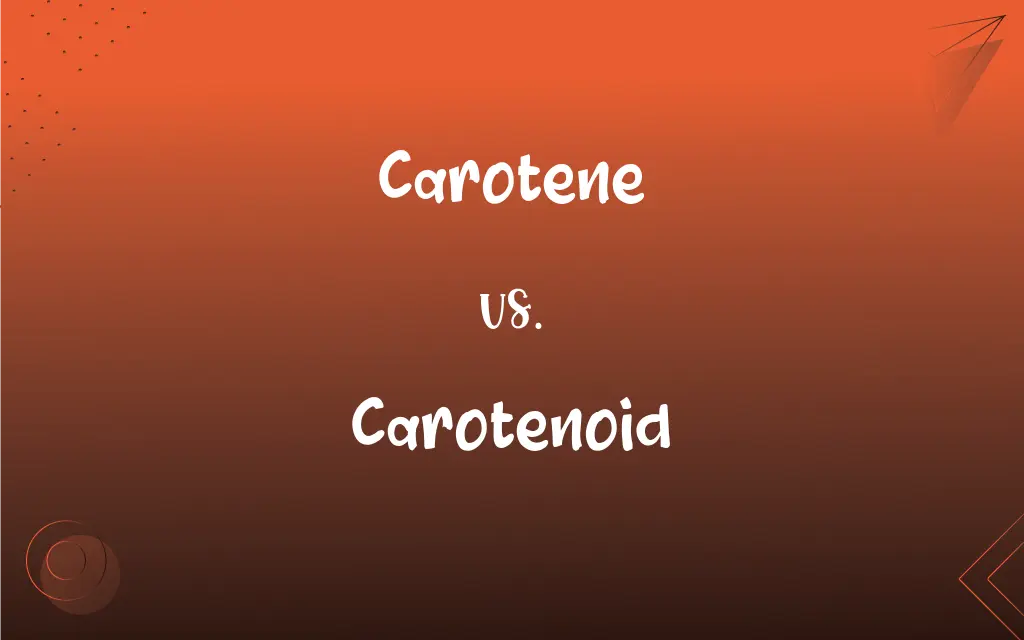Carotene vs. Carotenoid: What's the Difference?
Edited by Janet White || By Harlon Moss || Published on February 5, 2024
Carotene is a type of carotenoid, which is a larger group of pigments naturally occurring in plants and photosynthetic organisms.

Key Differences
Carotene refers specifically to orange-colored pigments found in plants, while carotenoids are a broader class of pigments, including carotenes and others, that vary in color.
Carotenes are hydrocarbons and include alpha and beta-carotene, known for their role in plant coloration and human nutrition. Carotenoids, encompassing carotenes, also contain oxygenated compounds like lutein and zeaxanthin.
Carotenes are abundant in carrots and sweet potatoes, contributing to their orange color and providing vitamin A precursors. Carotenoids, including carotenes and xanthophylls, are found in a wide range of fruits and vegetables, offering various health benefits.
Carotenes play a specific role in photosynthesis by protecting chlorophyll from damage. Carotenoids, in a broader sense, are involved in photosynthesis and protect plants against environmental stress.
Research on carotenes often focuses on their antioxidant properties and role in human health. Carotenoids are studied and used in a wider array of applications, including food colorants and supplements.
ADVERTISEMENT
Comparison Chart
Definition
Specific type of orange pigment in plants
Broad class of pigments in plants
Chemical Structure
Hydrocarbons only
Includes both hydrocarbons and oxygenated compounds
Dietary Role
Source of vitamin A precursors
Offer various health benefits
Variants
Mainly alpha and beta-carotene
Includes carotenes and xanthophylls
Industrial Use
Limited to specific health applications
Wider range including food colorants
ADVERTISEMENT
Carotene and Carotenoid Definitions
Carotene
An orange pigment found in plants.
The vibrant orange of carrots is due to carotene.
Carotenoid
Substances with antioxidant properties in the human diet.
Carotenoids in fruits and vegetables help combat oxidative stress.
Carotene
A precursor to vitamin A in human nutrition.
Sweet potatoes are rich in carotene, aiding in vitamin A synthesis.
Carotenoid
Compounds used in food industry as natural colorants.
Carotenoids are often added to food products to enhance color.
Carotene
An antioxidant beneficial for human health.
Dietary carotene has been linked to improved eye health.
Carotenoid
A group of pigments found in plants and algae.
Lutein, a type of carotenoid, is present in green leafy vegetables.
Carotene
A component aiding in photosynthesis protection.
Carotene protects plant leaves from photodamage.
Carotenoid
Pigments that include both carotenes and xanthophylls.
Carotenoids like zeaxanthin are crucial for eye health.
Carotene
A type of carotenoid without oxygen in its structure.
Beta-carotene is a well-known carotene providing vitamin A.
Carotenoid
Compounds contributing to the red, orange, and yellow colors in plants.
The red color of tomatoes comes from the carotenoid lycopene.
Carotene
An orange-yellow to red crystalline pigment, C40H56, found in animal tissue and certain plants, such as carrots and squash. It exists in several isomeric forms and is converted to vitamin A in the liver.
Carotenoid
Any of a class of yellow to red pigments, including the carotenes and the xanthophylls.
Carotene
(organic chemistry) A class of tetraterpene plant pigments; they vary in colour from yellow, through orange to red, this colour originating in a chain of alternating single and double bonds.
Carotenoid
Of or relating to such a pigment.
Carotene
(organic chemistry) Specifically, a number of isomers of tetraterpene hydrocarbons, C40H56, (especially beta-carotene), present in carrots etc, which are converted into vitamin A in the liver.
Carotenoid
(organic chemistry) Any of a class of yellow to red organic pigments including the carotenes and xanthophylls.
Carotene
An orange isomer of an unsaturated hydrocarbon found in many plants; is converted into vitamin A in the liver
Carotenoid
(organic chemistry) Of or relating to such a class of pigments.
Carotene
Yellow or orange-red fat-soluble pigments in plants
Carotenoid
Any of a class of highly unsaturated yellow to red pigments occurring in plants and animals
FAQs
Can the body convert carotene to vitamin A?
Yes, the body can convert certain carotenes like beta-carotene into vitamin A.
Is carotene only found in orange vegetables?
Primarily, but it's also present in some green vegetables where its color is masked.
Is carotene soluble in water?
No, carotene is fat-soluble.
Do cooking methods affect carotene content in food?
Yes, cooking can affect carotene levels, sometimes making them more bioavailable.
Can consuming carotenoids improve skin health?
Yes, they can protect skin from UV damage and improve its appearance.
Do all carotenoids have vitamin A activity?
No, only certain carotenoids like beta-carotene are precursors to vitamin A.
Do carotenoids have anti-inflammatory properties?
Yes, some carotenoids have anti-inflammatory effects.
Are carotenoids only beneficial for eye health?
They benefit eye health but also have other roles, like supporting immune function.
Can carotene be used as a food coloring?
Yes, it's used as a natural food coloring.
Are synthetic carotenoids as effective as natural ones?
They can be effective but may not always have the same benefits as natural ones.
Can carotenoids be found in animal products?
Yes, when animals consume carotenoid-rich plants.
Is dietary fat necessary for carotene absorption?
Yes, as carotenes are fat-soluble, dietary fat aids in their absorption.
Are all carotenes antioxidants?
Most carotenes have antioxidant properties.
Are there any risks associated with high carotene intake?
Excessive intake may lead to carotenemia, causing skin to turn yellow-orange.
Do carotenoids help in preventing cancer?
Some studies suggest they may help reduce the risk of certain cancers.
Is beta-carotene the most important carotene?
It's one of the most important due to its vitamin A activity.
Can carotenoids improve cardiovascular health?
They may contribute to heart health by reducing oxidative stress.
Are carotenoids affected by storage conditions?
Yes, exposure to light and air can degrade carotenoids.
About Author
Written by
Harlon MossHarlon is a seasoned quality moderator and accomplished content writer for Difference Wiki. An alumnus of the prestigious University of California, he earned his degree in Computer Science. Leveraging his academic background, Harlon brings a meticulous and informed perspective to his work, ensuring content accuracy and excellence.
Edited by
Janet WhiteJanet White has been an esteemed writer and blogger for Difference Wiki. Holding a Master's degree in Science and Medical Journalism from the prestigious Boston University, she has consistently demonstrated her expertise and passion for her field. When she's not immersed in her work, Janet relishes her time exercising, delving into a good book, and cherishing moments with friends and family.






































































